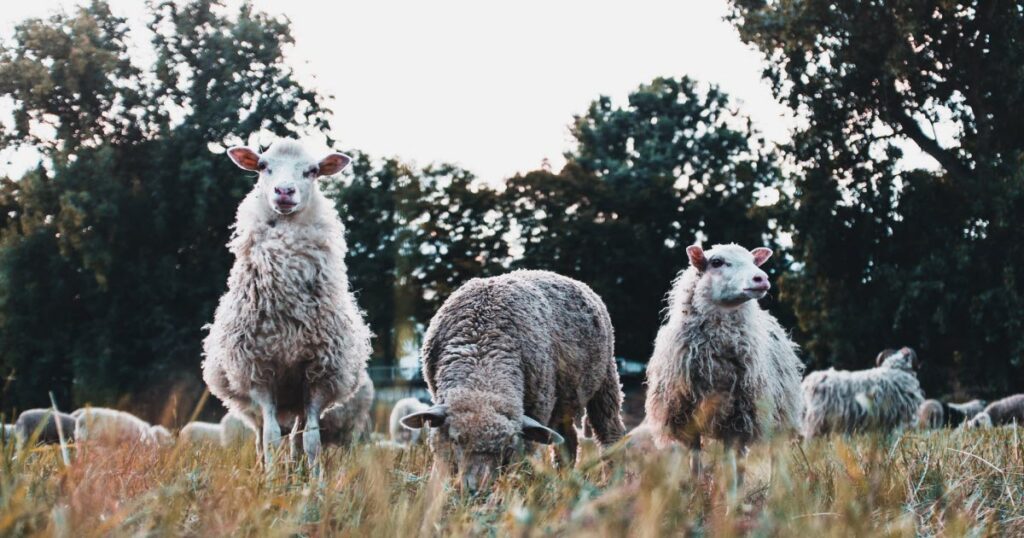Shearing, skirting, and spinning are part of the cycle for farmers on sheep fiber farms. They are activities that require hard work to ensure that the fleece is ready to be sold at a high standard. However, the quality of the fleece your sheep produce relies on effective management practices. The way you take care of your sheep before they are sheared is of critical importance. Today we’ll look at sheep nutrition for wool production, and how the feed you provide to your flock will play a major role in the quality and quantity of wool your sheep produce.
Whether you raise your sheep for meat, for show, or for wool, their diet will play a critical role in whether or not they thrive.
Let’s start by exploring the factors that impact wool production in sheep and how nutrition fits in.
Understanding Wool Fiber Quality & Production
Before being able to ensure that your sheep produce high quality wool, it is important to understand the way that fiber works, in order to figure out ways in order to enhance it.
First, what qualifies as good or high quality wool fiber?
Fibers with a low micron count, and high fleece weight are ideal for many uses. Producing this type of wool fiber ensures that the wool is not too fine and not too coarse. Wool fibers that are too fine will end up breaking apart and not making it through the skirting and spinning process. Fibers that are too coarse may be difficult to spin.
There are three primary factors that affect the quality of wool:
- the environment the sheep is raised in,
- the nutrition intake of the sheep, and
- genetic potential.
As the owner of a fiber farm you have some control over each of these factors, but what you feed and how you care for your sheep will have the biggest short-term impact on the quality of the wool your flock produces.
Superior breeding is a long-term practice that can enhance the product of your fiber farm.
Let’s take a closer look at each of these three factors:
Environment
Environmental factors are extremely overlooked in terms of sheep and their wool.
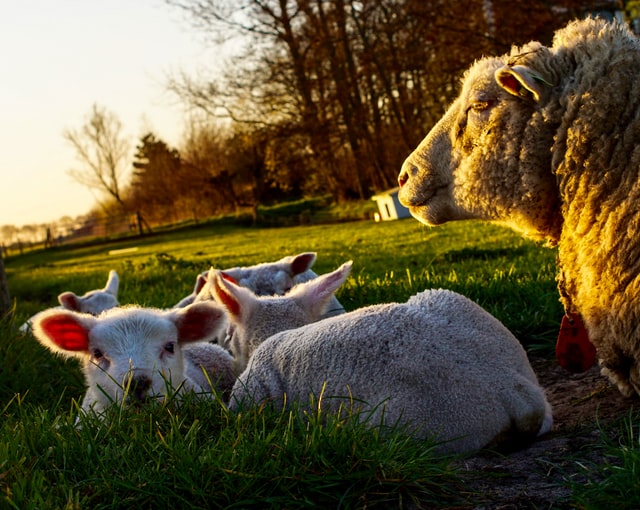
While feeding with vitamins and nutrients are important factors, high quality wool starts with sheep and their environment. In fact, some of the best wool comes from flocks that were raised on confinement farms.
Environmental stressors such as the weather, and even pesticides work as stressors to sheep which in turn results in fine wool.
Just like humans, stressors cause mental damage which in the process begins to affect the body physiologically. Stressors and trauma to sheep can prevent proper growth of wool and even result in stress to the follicles themselves.
Feeding
Feeding your sheep to produce high quality wool fiber is not only a matter of what you are feeding them, but also when and how much.
Consider a feeding schedule over the course of a year. Think of where your flock is in terms of its fiber production, and feed them accordingly.
Sheep follow a schedule, with wool growing at different rates during different times of year based on factors such as weather, pregnancy, access to high quality food and water, and more.
Consider supplementing their forage when your flock needs it most to provide them the nutrients they need to grow high-quality, consistent wool.
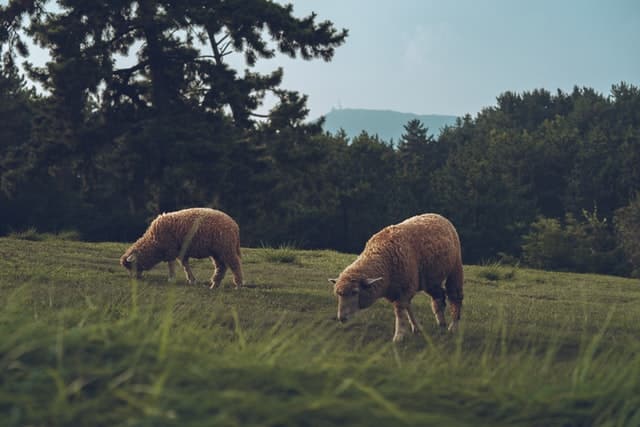
I find that breaking the year up into ~100 day periods which require different degrees of feed supplementation is effective. In the summer when my flock is primarily on pasture I supplement with plenty of minerals and water, in the winter when ewes are pregnant and the weather is cold I provide extra hay, minerals, and grain (for a month before delivery and during lactation).
While you want to give your flock what it needs, it’s critical to avoid overfeeding your sheep. Overfeeding results in fibers that are too coarse.
Breeding
Raising sheep with high quality fibers is a long and rewarding process. However, in terms of thinking smarter rather than harder, consider breeding your sheep with fleece production top of mind.
Start by keeping records of your sheep and notes about the wool they produce each year. With this record you will be able to select the best sheep to breed, and you’ll be able to know which ones you should cull.
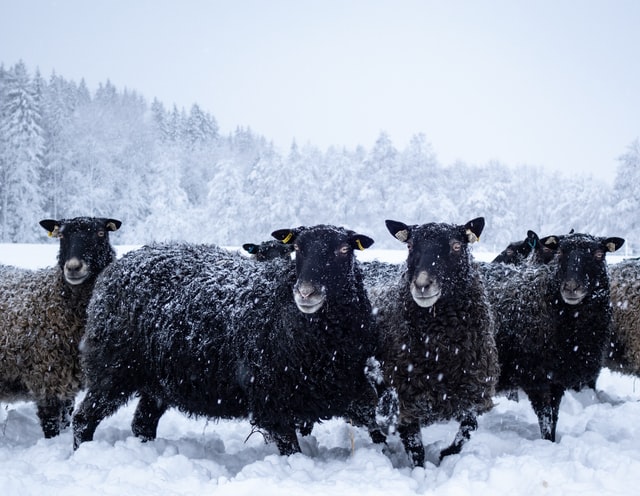
Improving the quality of your flock’s wool through breeding is the long game. Stay patient and true to your goals.
Notable observations include:
- which sheep produces the most wool,
- who produces the highest quality wool, and
- which sheep has the most consistent fleece.
Use ear tags to keep track of your sheep and keep accurate records, and take notes about the grease weight of each fleece and the finished weight after skirting.
Remember, wool comes from follicles which are genetic. Selecting for the type of fiber you (or your clients if you sell your wool) prefer, will pay off in the long run.
What to Feed Your Sheep for Superior Wool
Now that we have established the simple practices that make all the difference in raising sheep for wool, it is time to now further discuss feeding and nutrients in order to maximize wool and production quality from your sheep.
Your sheep basically require three things:
- Water
- Nutrients
- Supplemental Minerals
and we’ll explore each of these below. Things like an effective de-worming program can also play a role in the quality and quantity of wool your sheep produce, so be sure to check out my guide on that topic.
Water Requirements
Just like humans, hydration is key to a healthy living. Making sure your sheep are properly hydrated with fresh water is essential to making sure they produce high quality fibers for their wool.
Dehydration can cause organs to shut down which all in all causes stressors to the sheep which prevents proper wool production.
Periods of stress can actually cause week point in the wool staple, so be sure to provide access to clean, fresh water at all times.
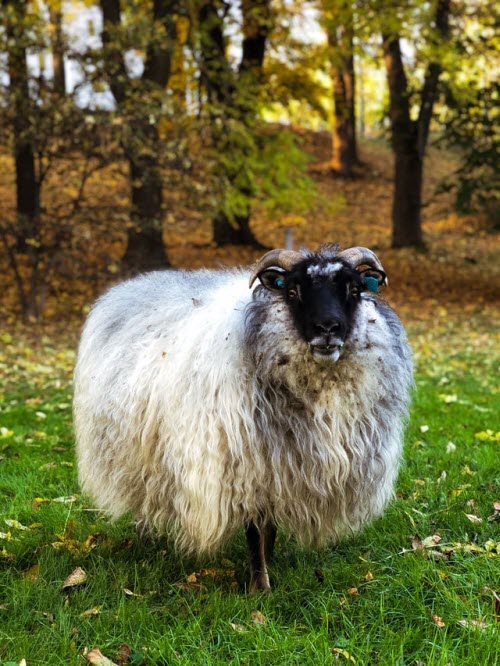
Nutrients and Supplements
Grass is the main food source for every flock of sheep. Grazing on grass for large flocks is an ample source of protein as naturally grown grass is rich in amino acids. Making sure there are no harmful pesticides in your grass is important. While grass is essential in the diet of a sheep, they need the proper nutrients in order to produce high quality wool.
Proper nutrition for sheep means expanding their diet.
Investing in proper mixes of nutrients is an essential step to maximizing wool production. Consider store bought pre-mixed nutrients. When looking for store bought mixes be sure to read through all the ingredients. Prepared mixes may contain high levels of copper which is toxic to sheep and can prevent them from producing wool. A lot of local farm supply stores sell mineral licks with copper because cattle prefer (and need) it, so always check the ingredients.
Copper toxicity can also be found when there is an excess of nutrients and minerals. Therefore, everything served to sheep should be done so in moderation to ensure that they are not being overfed and are not suffering from copper toxicity.
Vitamins and minerals should be spread out and not heavily concentrated in their mixes to ensure that a healthy amount of vitamins and minerals are consumed.
I find that offering consistent access to mineral supplements is the best way to avoid this. Sheep won’t go crazy and overdo it if they have access to it all the time – it’s when you drop in a tub of minerals sweetened with molasses that you risk sheep eating too much in a single go.
Grains and Concentrates
Energy is a major factor in the wool production of a sheep. Therefore, they should be consuming foods high in grains and carbohydrates in order to further boost production at key times of the year (like during lactation for example).
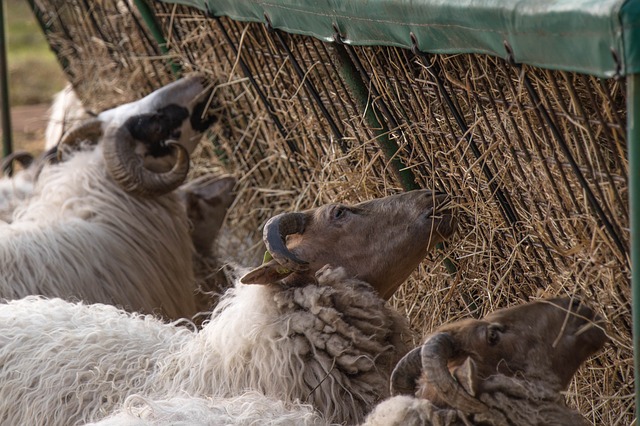
Cornstarch is a great source of energy that can easily be added to any nutrient mix. Forages such as fiber and cellulose are also sources of energy. Adding these elements with browse, hay, grain and silage is a start to ensuring that the energy intake of your sheep goes up.
Minerals are an important part of sheep diets and are complex in its root. Among all the wool producing minerals, Sulfur is one of the most important as it contains and aids amino acids and boosts production of proteins such as keratin.
Just like humans, keratin is essential for producing strong, healthy wool.
Vitamins are essential in the overall well-being of sheep. Don’t underestimate the power of contentment to produce a better quality product on your fiber farm. Low-stress and high quality of life aids in wool production.
Vitamins A, D and E are most necessary for sheep. Vitamin A can not be found in plants which means that sheep are naturally lacking in vitamin A. Vitamin D is also essential in retaining the strength of the sheep. Remember, weak sheep will not be around long enough to produce wool. Vitamin B6 is also essential as it aids in follicle growth.
Prioritizing Sheep Nutrition for Wool Production
Healthy sheep produce healthy wool. Healthy wool allows for easy shearing, skirting, and spinning, which in the end provides you what you need for superior fleece products.
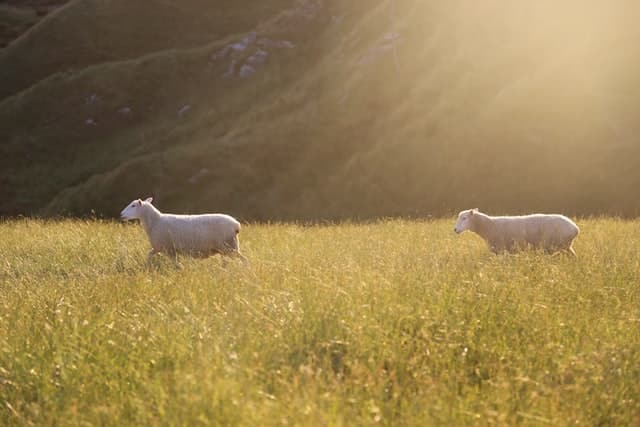
The best way to maximize wool quantity and quality on your fiber farm is to take care of the sheep wool comes from.
Caring for your sheep the right way, ensuring they have a safe, stress-free environment with access to the sheep nutrition for wool production they need will guarantee the wool growth you’re after.

